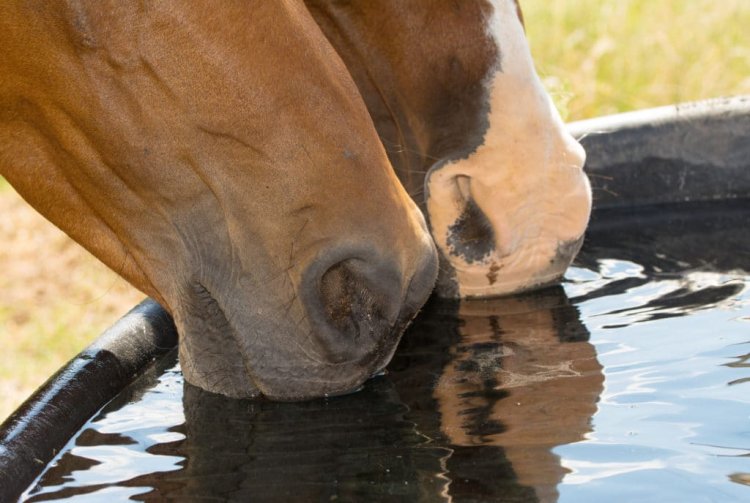in basket
TOP OFFER - SUMMER20 - 20% OFF and 4 FREE seasonal products!
Does my horse need an electrolyte supplement?

What are electrolytes and why are they important?
The major electrolytes include sodium, potassium, chloride, calcium and magnesium. Even when your horse is resting, he or she will lose electrolytes through faeces, urine and their breath. During exercise electrolyte loss is increased through sweating. Sweating is how your horse regulates his or her body temperature, but the loss of fluids and electrolytes needs to be taken into account when you are considering your horse's ration.
There are also times of the year when it is warmer weather and your horse will sweat even more during exercise. The amount of sweat your horse will lose depends on a number of factors, including weather conditions, air movement, fitness level and temperament. As a guide a horse doing moderate exercise for an hour will lose around 5 litres of sweat and a horse that is dripping with sweat may have lost up to 15-18 litres. Below is a table from a research study conducted to estimate sweat loss by assessing sweat patterns on different areas of the horse.
| Sweat Score | Sweat Pattern | Total Sweat Loss |
|---|---|---|
| 1 | The area under the saddle is partly dry, partly dark, sticky, and moist. The throat area is sticky, and the flanks are darker than normal. | 1 - 4 litres |
| 2 | The area under the saddle and the throat are both wet, there are small white areas at the edges of the saddle corners, and foaming may occur at sites of friction between the throat and reins and between the limbs. | 4 - 7 litres |
| 3 | There is foam on the back of the bridle and noseband, the flanks are clearly wet, and the area under the saddle and girth are consistently wet. | 7 - 9 litres |
| 4 | The throat and flanks are completely wet, above the eyes are moist and have dark wrinkles, and there is pronounced foaming between the limbs. | 9 - 12 litres |
| 5 | The horse is actually dripping fluid above the eyes and under the belly. | 12 - 18 litres |
Source: Zeyner et al. (2014). Scoring of sweat losses in exercised horses – A pilot study. Journal of Animal Physiology and Animal Nutrition 98: 146-50.
Does my horse need an electrolyte supplement?
If your horse is in work then the answer to this question is yes. Commercial feed mixes and forage do contain electrolytes, but only in amounts that are adequate for horses at maintenance or in light work. In particular, the one electrolyte most likely to be deficient is sodium (salt). Therefore, a horse that is doing anything other than light work will not have its electrolyte requirements met without supplementation.
One thing to bear in mind is that horses do not regulate their intakes from salt blocks; for example, if a horse needs 30 g of salt per day there are some horses that will not use the salt lick at all and others that will consume much more salt than they require, even up to 4 times more! Therefore, it is much better to add electrolytes to your horses feed or by syringe. Adding electrolytes to water also makes it difficult to know how much electrolytes your horse is consuming and so it is difficult to make sure you are meeting your horse’s electrolyte requirements by adding them to drinking water. We recommend supplementation with ElectrolytePlus electrolyte supplement which is designed to complement good management to help your horse stay hydrated and maintain good health.
How much electrolytes should I feed my horse and when?
The amount of electrolytes needed depends on diet, time or year and level of work. For horses in work, electrolytes should be fed every day. One litre of horse sweat contains approximately 3.5 g of sodium, 6 g of chloride, 1.2 g of potassium and 0.1 g calcium. Therefore, for 5 litres of sweat loss following an hour of moderate exercise your horse needs approximately 50 g of electrolytes. It is best to feed electrolytes every day. It is often the case that horses are only fed electrolytes around a specific competition; however, if enough electrolytes are fed each day then it is unlikely that additional supplementation will be required during competition. It can take a long time (weeks or months) to replenish electrolyte levels and so feeding just before and after competing is not recommended; it is much better to feed an electrolyte supplement every day.
Can I feed my horse too much electrolytes?
If you are feeding according to the manufacturer’s guidelines it is unlikely that you will be over-supplementing electrolytes. Generally, horses are under-supplemented rather than over-supplemented. Signs of over-supplementing are drinking more water and urinating more. If an electrolyte paste is given then it is NOT the case that this will dehydrate the horse by drawing electrolytes into the gastrointestinal tract. An electrolyte paste will pull water into the gastrointestinal tract, but what this does is increase the concentration of electrolytes in the horse’s blood triggering the horse to drink. When this does become a problem is if an electrolyte paste is given and the horse is not provided with free access to water. As a guide, a 500 kg horse being exercised moderately in cool to warm weather will drink around 30 litres in 24 hours.
Overall recommendations for electrolyte supplementation in horses
- All horses need electrolytes daily
- Horses at maintenance or in light work may only need a small amount of salt added
- Electrolytes should be fed according to level of work and weather conditions
- Feed electrolytes daily during training and not just around competition periods
Article written for Premier Performance by Professor Jo-Anne Murray.








